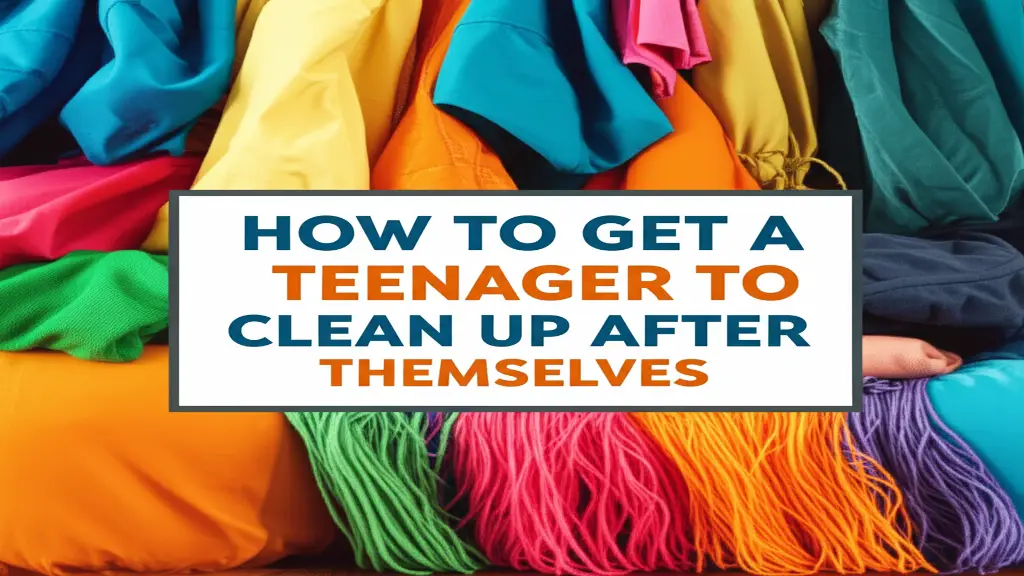· Parenting & Home · 7 min read
How To Get A Teenager To Clean Up After Themselves

Tired of Nagging? How To Get Your Teenager To Clean Up After Themselves
Is your teenager’s room a disaster zone? Do you find yourself constantly picking up after them? You’re not alone! Getting a teenager to clean up after themselves is a common struggle for many parents. This article will provide you with practical strategies to motivate your teen to take responsibility for their space and belongings. We’ll explore everything from setting clear expectations to implementing effective chore systems, helping you reclaim your sanity and foster a more harmonious home. Let’s dive into how to encourage a cleaner lifestyle for your teen.
Takeaway:
- Establish clear expectations and consequences.
- Involve your teen in creating chore schedules.
- Focus on positive reinforcement rather than nagging.
- Lead by example and maintain a clean home yourself.
- Connect chores to privileges and financial independence.
Quick Answer:
To get your teenager to clean up after themselves, establish clear expectations, create a chore system with consequences and rewards, and foster a sense of responsibility by linking chores to privileges or allowance. Consistency and positive reinforcement are key to success.
1. Understanding the Teenage Brain & Messiness
Before diving into solutions, it’s helpful to understand why teenagers are often messy. Their brains are undergoing significant development, particularly in the prefrontal cortex, which is responsible for executive functions like planning, organization, and impulse control. This means they may genuinely struggle with prioritizing cleaning and maintaining order. It’s not necessarily laziness, but a developmental stage. Recognizing this can shift your approach from frustration to empathy.
Furthermore, teenagers are striving for independence. Constant nagging can feel controlling and lead to resistance. Instead of focusing on the mess itself, frame cleaning as a demonstration of responsibility and a step towards greater autonomy. You can also encourage them to take ownership of their space by letting them decorate it in a way that reflects their personality. If they feel a sense of pride in their room, they might be more inclined to keep it tidy. Consider discussing the importance of a clean environment for their well-being and productivity.
2. Setting Clear Expectations & Boundaries
Vague requests like “Clean your room!” are often ineffective. Instead, be specific about what you expect. Break down the task into smaller, manageable steps. For example, instead of “Clean your room,” say, “Please make your bed, put your dirty clothes in the hamper, and clear everything off your desk.”
Clearly define what constitutes a “clean” room. Is it just surface clutter, or does it include vacuuming, dusting, and organizing drawers? Write down these expectations and post them somewhere visible. This eliminates ambiguity and reduces arguments. Also, establish boundaries regarding common areas. Explain that everyone in the family is responsible for keeping shared spaces tidy. You might say, “Dishes need to be washed after each meal, and living room toys need to be put away before bedtime.” https://beacleaner.com/how-to-clean-home can provide additional ideas for establishing a cleaning routine.
3. Creating a Chore System That Works
A chore system provides structure and accountability. Involve your teenager in the process of creating the schedule. This gives them a sense of ownership and makes them more likely to follow through.
Here are a few options:
- Rotating Chores: Assign different chores each week to prevent boredom.
- Fixed Chores: Assign specific chores that your teen is responsible for consistently.
- Points System: Assign points to each chore, and allow your teen to redeem those points for privileges or rewards.
Be realistic about the amount of time each chore should take. Don’t overload your teen with an impossible list. Consider their school schedule, extracurricular activities, and social life. A visual chore chart can be helpful, especially for younger teenagers. https://www.beacleaner.com/how-often-to-clean-windows offers insights into establishing a regular cleaning schedule.
4. The Power of Positive Reinforcement (and Consequences)
Nagging is counterproductive. It creates resentment and rarely motivates lasting change. Instead, focus on positive reinforcement. Praise your teen when they complete their chores without being asked. A simple “Thank you for keeping your room tidy!” can go a long way.
However, positive reinforcement should be paired with clear consequences for not fulfilling their responsibilities. These consequences should be logical and related to the chore. For example, if your teen doesn’t do their laundry, they may not have clean clothes for the weekend. If they don’t clean the kitchen after using it, they may lose access to the kitchen for a period of time. Avoid punishments that are overly harsh or unrelated to the issue. Remember, the goal is to teach responsibility, not to punish. You can also link chores to privileges like screen time or going out with friends.
5. Leading by Example: Modeling Cleanliness
Teenagers learn by observing their parents. If your home is consistently messy, it’s difficult to expect your teen to maintain a clean room. Lead by example and demonstrate the importance of cleanliness.
Make cleaning a family affair. Spend time cleaning together, and make it a positive experience. Put on some music, chat, and work as a team. This shows your teen that cleaning isn’t a punishment, but a shared responsibility. Also, be mindful of your own habits. If you leave your belongings lying around, your teen is more likely to do the same. https://beacleaner.com/how-to-clean-bathroom provides tips for maintaining a clean bathroom, a common area for family use.
6. Connecting Chores to Financial Independence & Future Skills
As teenagers get older, they may be interested in earning money. Connect chores to allowance or opportunities to earn extra money. This teaches them the value of hard work and financial responsibility.
You can also frame chores as valuable life skills. Explain that knowing how to clean and organize is essential for success in college, the workplace, and independent living. Learning to manage their time and prioritize tasks will benefit them throughout their lives. Discuss how maintaining a clean and organized space can reduce stress and improve productivity. https://beacleaner.com/how-to-clean-under-bed can help them tackle those often-overlooked cleaning tasks.
7. Negotiation & Compromise: Finding Middle Ground
Sometimes, a little negotiation can go a long way. Be willing to compromise with your teen. Perhaps they prefer to clean their room on the weekend instead of during the week. Maybe they’re willing to take on extra chores in exchange for a later curfew.
The key is to find a solution that works for both of you. Listen to your teen’s concerns and be open to their suggestions. This demonstrates respect and fosters a more collaborative relationship. Remember, the goal is not to win an argument, but to create a sustainable system that promotes responsibility and cleanliness.
Frequently Asked Questions (FAQ)
Q: My teen refuses to do any chores. What should I do?
A: Start small, focusing on one or two manageable tasks. Avoid power struggles and instead, calmly explain the importance of contributing to the household. Connect chores to privileges they value, and consistently enforce consequences for non-compliance.
Q: How often should my teen clean their room?
A: This depends on your teen and your family’s standards. A weekly deep clean, with daily tidying, is a good starting point.
Q: What if my teen does a poor job cleaning?
A: Don’t redo the chore for them. Instead, provide constructive feedback and explain what needs to be improved. Offer to work with them to show them the proper techniques.
Q: Is it okay to offer rewards for cleaning?
A: Yes, positive reinforcement can be very effective. However, avoid making rewards the sole motivator. Focus on instilling a sense of responsibility and pride in a clean space.
Q: My teen says they don’t have time for chores. What should I say?
A: Help them prioritize their time and create a schedule that includes chores. Explain that everyone has responsibilities, and contributing to the household is part of being a family member.
Conclusion: Building Responsibility, One Chore at a Time
Getting a teenager to clean up after themselves requires patience, consistency, and a willingness to adapt your approach. Remember that understanding their developmental stage and fostering a sense of responsibility are crucial. By setting clear expectations, creating a fair chore system, and leading by example, you can help your teen develop valuable life skills and contribute to a more harmonious home. Don’t give up! The effort you put in now will pay off in the long run, creating a more responsible and independent young adult. Continue to reinforce the importance of cleanliness and organization, and celebrate their successes along the way.
- teenage mess
- cleaning motivation
- chore chart
- teen responsibility
- household chores




